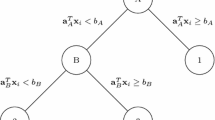Abstract
Committee selection with diversity or distributional constraints is a ubiquitous problem. However, many of the formal approaches proposed so far have certain drawbacks including (1) computational intractability in general, and (2) inability to suggest a solution for instances where the hard constraints cannot be met. We propose a cubic-time algorithm for diverse committee selection that satisfies natural axioms and draws on the idea of using soft bounds.
Similar content being viewed by others
Notes
The model where synergies or presence of diverse agents provide additional points to the committee has been considered in a general model by Izsak et al. (2018).
More general models also allow for expressing upper quotas. The goal of the upper quotas can easily be met by setting lower quotas on the complement of the set of types.
Note that \(\underline{q^t}\) is not a vector. The underscore denotes that it is a lower bound.
References
Aziz H, Lang J, Monnot J (2016) Computing pareto optimal committees. In: Proceedings of the 25th international joint conference on artificial intelligence (IJCAI), pp 60–66
Aziz H, Brill M, Conitzer V, Elkind E, Freeman R, Walsh T (2017) Justified representation in approval-based committee voting. Soc Choice Welf 48(2):461–485
Brams SJ, Potthoff RF (1990) Constrained approval voting: a voting system to elect a governing board. Interfaces 20(2):67–80
Bredereck R, Faliszewski P, Igarashi A, Lackner M, Skowron P (2018) Multiwinner elections with diversity constraints. In: Proceedings of the 32nd AAAI conference on artificial intelligence (AAAI). AAAI Press
Celis LE, Huang L, Vishnoi NK (2018) Group fairness in multiwinner voting. In: Proceedings of the 26th international joint conference on artificial intelligence (IJCAI), pp 144–151
Ehlers L, Hafalir IE, Yenmezb MB, Yildirimc MA (2014) School choice with controlled choice constraints: hard bounds versus soft bounds. J Econ Theory 153:648–683
Faliszewski P, Skowron P, Slinko A, Talmon N (2017) Multiwinner voting: a new challenge for social choice theory. In: Endriss U (ed) Trends in computational social choice, chap. 2
Goto M, Kojima F, Kurata R, Tamura A, Yokoo M (2017) Designing matching mechanisms under general distributional constraints. Am Econ J: Microecon 9(2):226–62
Izsak R, Talmon N, Woeginger G (2018) Committee selection with intraclass and interclass synergies. In: Proceedings of the 32nd AAAI conference on artificial intelligence (AAAI). AAAI Press
Kamada Y, Kojima F (2015) Efficient matching under distributional constraints: theory and applications. Am Econ Rev 105(1):67–99
Kuo C-C, Glover F, Dhir KS (1993) Analyzing and modeling the maximum diversity problem by zero-one programming. Decis Sci 24(6):1171–1185
Kurata R, Hamada N, Iwasaki A, Yokoo M (2017) Controlled school choice with soft bounds and overlapping types. J Artif Intell Res 58:153–184
Lang J, Skowron P (2016) Multi-attribute proportional representation. In: Proceedings of the 30th AAAI conference on artificial intelligence (AAAI), pp 530–536. AAAI conference on artificial intelligence (AAAI)
Papadimitriou CH (1994) Computational complexity. Addison-Wesley, Reading
Potthoff R (1990) Use of linear programming for constrained approval voting. Interfaces 20(5):79–80
Ratliff TC (2006) Selecting committees. Public Choice 126(3/4):343–355
Straszak A, Libura M, Sikorski J, Wagner D (1993) Computer-assisted constrained approval voting. Group Decis Negot 2(4):375–385
Author information
Authors and Affiliations
Corresponding author
Additional information
Publisher's Note
Springer Nature remains neutral with regard to jurisdictional claims in published maps and institutional affiliations.
Rights and permissions
About this article
Cite this article
Aziz, H. A Rule for Committee Selection with Soft Diversity Constraints. Group Decis Negot 28, 1193–1200 (2019). https://doi.org/10.1007/s10726-019-09634-5
Published:
Issue Date:
DOI: https://doi.org/10.1007/s10726-019-09634-5
Keywords
- Social choice theory
- Committee voting
- Multi-winner voting
- Diversity constraints
- Computational complexity




